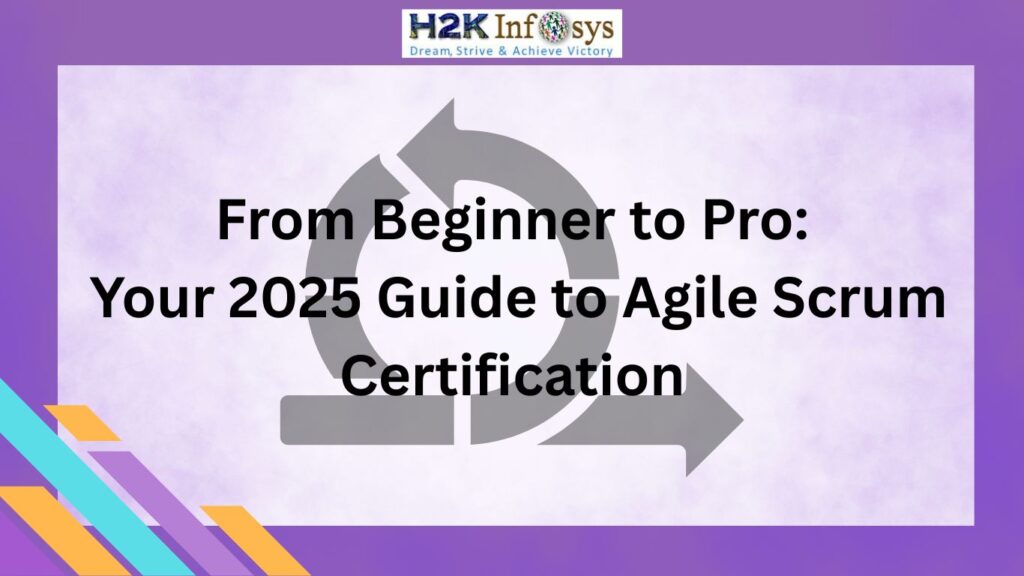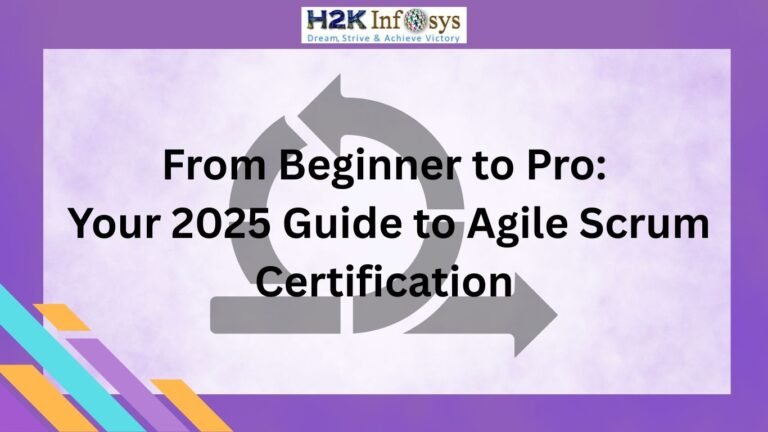Introduction
In today’s dynamic job market, Agile practices are transforming how teams work and deliver value. More organizations are turning to Scrum, a lightweight Agile framework, to enhance project outcomes, collaboration, and customer satisfaction. This shift is driving demand for professionals who meet the Key Requirements for Agile Scrum Certification an essential credential for those seeking leadership roles in Agile project environments.
Whether you’re a beginner, an IT expert, or switching careers, understanding the Key Requirements for Agile Scrum Certification helps you take the first step toward a successful and rewarding Scrum agile certification career.
What Is Agile Scrum Certification?
Agile Scrum certification validates your understanding of Agile values and the Scrum framework. It confirms that you can serve as a Scrum Master an Agile team leader who supports collaboration, removes obstacles, and ensures continuous delivery.
Courses such as the Professional Scrum Master (PSM) provide training that aligns with the Key Requirements for Agile Scrum Certification, equipping you with practical knowledge and tools used in real-world Agile settings.
Why Is Scrum Certification in Demand?
The State of Agile Report shows that over 58% of Agile organizations use Scrum. As a result, meeting the Key Requirements for Agile Scrum Certification gives professionals a competitive edge.
Benefits of certification include:
- Recognition as a qualified Agile leader
- Access to high-paying roles like Scrum Master or Agile Coach
- Increased credibility among team members and employers
- Exposure to tools such as Jira and Confluence
With the right training, like scrum master training and placement programs at H2K Infosys, you can fulfill the Key Requirements for Agile Scrum Certification and enter a thriving job market.
Key Requirements for Agile Scrum Certification: A Closer Look
Let’s break down the Key Requirements for Agile Scrum Certification and how to meet them step by step.
1. Strong Understanding of Agile Fundamentals
Before certification, you must know Agile values, principles, and how they differ from traditional project management. This is a foundational part of the Key Requirements for Agile Scrum Certification, and most scrum training online programs start here.
2. Thorough Knowledge of the Scrum Framework
A core part of the Key Requirements for Agile Scrum Certification is mastering:
- Scrum roles: Scrum Master, Product Owner, Development Team
- Scrum events: Sprint, Daily Scrum, Sprint Review, Sprint Retrospective
- Scrum artifacts: Product Backlog, Sprint Backlog, Increment
Courses that include scrum training classes or live sessions provide practical scenarios for applying these concepts.
3. Enroll in a Comprehensive Scrum Training Program
To meet the Key Requirements for Agile Scrum Certification, you should join a structured training program. At H2K Infosys, our Professional Scrum Master course includes:
- Instructor-led classes
- Agile simulations and group exercises
- Certification exam preparation
- Resume building and mock interviews
- Scrum master training and placement support
Whether you’re searching for scrum master training near me or flexible scrum training online, these courses help you fulfill the Key Requirements for Agile Scrum Certification efficiently.

Real-Time Experience: Why It’s Crucial
Another vital component of the Key Requirements for Agile Scrum Certification is hands-on experience. Employers look for candidates who not only understand Scrum but have applied it.
At H2K Infosys, you’ll work on real-time Agile projects where you:
- Conduct sprint planning
- Run daily stand-ups
- Lead retrospectives
- Use Jira to manage backlogs
Such experience ensures you’re not just certified but job-ready fulfilling one of the most practical Key Requirements for Agile Scrum Certification.
Exam Preparation for Agile Scrum Certification
To complete the Key Requirements for Agile Scrum Certification, you must pass the Professional Scrum Master exam.
PSM I Exam Overview:
- 80 questions (MCQ & True/False)
- Duration: 60 minutes
- Pass mark: 85%
How to prepare:
- Review the Scrum Guide multiple times
- Use official practice assessments
- Attend live exam-prep sessions
- Apply what you learn through practice projects
These efforts contribute directly to meeting the Key Requirements for Agile Scrum Certification and succeeding in the certification exam.
Tools You’ll Learn While Meeting the Key Requirements
As part of the Key Requirements for Agile Scrum Certification, candidates are expected to be familiar with industry tools like:
- Jira – for Agile task and sprint management
- Trello – for visual workflows and boards
- Confluence – for documentation and knowledge sharing
Training at H2K Infosys ensures you practice with these tools in real project environments, preparing you for future roles and satisfying the Key Requirements for Agile Scrum Certification.
Common Challenges (and How to Overcome Them)
Meeting the Key Requirements for Agile Scrum Certification isn’t always easy especially for beginners. Here are some common hurdles and tips:
1. Lack of Agile Background
Solution: Start with beginner modules in agile & scrum training programs that explain core principles clearly.
2. Limited Hands-On Practice
Solution: Choose training with real-time projects to bridge the gap between theory and execution.
3. Exam Anxiety
Solution: Use mock exams and attend revision sessions to build confidence and master all the Key Requirements for Agile Scrum Certification.
Career Growth After Scrum Certification
Meeting the Key Requirements for Agile Scrum Certification opens doors to several Agile roles:
| Role | Average Salary (USA) | Skills Gained |
|---|---|---|
| Scrum Master | $105,000+ | Team facilitation, Agile metrics, stakeholder communication |
| Agile Coach | $125,000+ | Organizational transformation, coaching multiple teams |
| Product Owner | $110,000+ | Backlog management, customer collaboration, product vision |
Graduates from our scrum master training and placement program have secured jobs in top U.S. companies thanks to fulfilling the Key Requirements for Agile Scrum Certification and gaining hands-on training.
Industry Applications of Scrum Certification
Scrum isn’t limited to software. Meeting the Key Requirements for Agile Scrum Certification prepares you for multiple sectors:
- Healthcare: Manage patient workflows, clinical trial tracking
- Finance: Deliver digital banking solutions and mobile apps
- Education: Build e-learning platforms with iterative feedback
- Marketing: Coordinate multi-channel campaigns with Agile sprints
Professionals who meet the Key Requirements for Agile Scrum Certification bring structured Agile thinking to diverse industries.
Ongoing Learning: Staying Certified and Competitive
Certification isn’t the end it’s a stepping stone. Staying updated is another often-overlooked part of the Key Requirements for Agile Scrum Certification.
What to do post-certification:
- Subscribe to Agile podcasts and newsletters
- Attend Agile conferences and webinars
- Join Scrum user groups and LinkedIn communities
- Explore advanced Scrum certifications (PSM II, SAFe, LeSS)
Continuous learning ensures your Agile career thrives beyond the initial certification and strengthens your foundation in the Key Requirements for Agile Scrum Certification.
Key Takeaways
- The Key Requirements for Agile Scrum Certification include understanding Agile, mastering Scrum, hands-on training, and passing the PSM exam.
- Choosing the right training program is critical look for scrum training online that includes real-time projects and placement support.
- Tools like Jira and real-world projects prepare you for Agile roles in multiple sectors.
- Post-certification, keep learning to remain relevant and grow in your career.
Conclusion
Meeting the Key Requirements for Agile Scrum Certification sets you apart in today’s job market. Whether you’re aiming to become a Scrum Master or grow into an Agile leadership role, the right training is key.
Join H2K Infosys today for comprehensive Scrum master training and placement support. Get certified, gain real-world experience, and take charge of your Agile career.


























